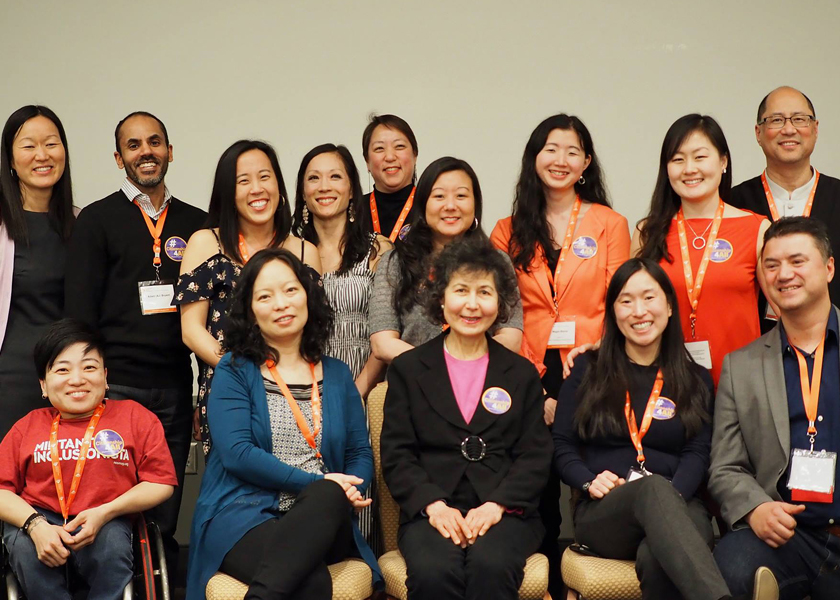Four-year push by Adoptees for Justice to get a bill before Congress finally pays off | By Martha Vickery (Fall 2020 issue)

After four years of advocacy and awareness promotion for a law designed to make citizens of all persons adopted from another country to the U.S., the efforts of the lobbying group Adoptees for Justice (A4J) is finally paying off.
According to A4J leaders, 2021 may be the year this bill finally becomes law. After 20 years of fixes to laws intended to make adoptees citizens, this 2019 version will comprehensively fix the deficiencies of past bills and shield all adoptees from the risks of non-citizenship.
Although there was a period of adjustment due to the pandemic, said Kristopher Larsen, A4J executive director, this year has been a very productive year for advancing the Adoptee Citizenship Act (ACA). Because of the way the meeting schedules work, they packed in more virtual meetings than could be done on a normal schedule, he said.
“We did 48 separate Zoom calls, …and now we have 91 co-sponsors for the bill, which is incredible compared with other years” Larsen said. Co-sponsors include the Judiciary Committee chair and co-chair —- the leaders of the committee that decides when the bill is ready to be introduced to Congress for a vote.
They were also able to get co-sponsorships from the chair and vice-chair of the Immigration Subcommittee, another key group, the director said.
Now, the bill is before the Judiciary Committee, Larsen said, its last stop before it is moved forward to the House of Representatives. “We are trying to push Chairman [Jerrold] Nadler to get it to mark-up,” he said, referring to a process where adjustments, changes and amendments are recommended by the Judiciary Committee. “Once it gets a mark-up, and with 91 co-sponsors and a lot more support for this, we are pretty confident this bill could pass in the House.”
“We’ve also been working closely with the Senate on this bill. We actually have more sponsors now than we have ever had in the Senate,” Larsen said. “We’ve been told because of the language [now on the bill] that they would try to keep the language as inclusive as possible. We know in the past, the Senate, especially the Republicans, there’s a lot of issues with the language on deportees.” The election has the potential to improve chances for a favorable Senate version of the bill. The language change that could be on the Senate’s bill would change the bill’s basics, Larson said. “This bill would still allow deportees to come back.”
There is bi-partisan agreement to A4J’s guiding principle on its website that “Citizenship is a civil right of all children adopted by a U.S. citizen parent. Children adopted by U.S. citizen parents should have the same rights as children of U.S. citizens.” How to get there is the question that is now getting a deep dive in Congress.
Anissa Druesdow, an adoptee deportee and A4J staff member, calling in from Costa Rica, said “even if they don’t want to include us in citizenship, our goal is just to get back home, and to be able to work towards citizenship. …from what I understand, it will get me back home and will give me a pathway to citizenship after a certain amount of time,” she said, adding “It doesn’t make sense not to include deportees, because we were adopted also.”
Previous versions of the ACA included versions in which language about returning deportees was going to be left out. “But advocates who are pushing for an all-inclusive bill know that that can’t happen,” Larsen said, particularly since the purpose of the bill is to repair 20 years of inadequate fixes, he said, “there is no way we would support a bill that left off the deportees. It has to include all adoptees.”
Larsen had worked for the precursor organization to A4J, called the Adoptee Rights Coalition, but quit the group in 2018, because there was language that excluded deportees, a concession to a Congress that was nervous about immigration issues at that time. Larsen, a Vietnamese American adoptee, was working in training and mentoring people who had recently been released from prison. He had been incarcerated, and a deportation order issued for him, he said, but deportation is prohibited by a Memorandum of Understanding between the U.S. and Vietnam. In investigating this order for deportation, he said, he and his family discovered his adoption paperwork had been lost by immigration, so the application for citizenship never acted upon, and no one was ever notified.
After quitting the Adoptee Rights Coalition, Larsen said he was later called by the National Korean American Service and Education Consortium (NAKASEC) which was working on the legislation through some skilled Korean adoptees, including former Minnesotan Emily Kessel. At a meeting in Chicago, Larsen said, he was asked to come back. The future policy stance would be that deportees would be included in the bill. NAKASEC provides support to A4J, as well as other partner organizations, and is the group’s fiscal sponsor.
The nuts and bolts of the bill include that for an adoptee to be covered by the bill, they must have been legally adopted in this country, through the court system, and must have arrived on a legal visa, Larsen said. Deportees would be subject to a background check, an as long as all legal obligations to the courts have been fulfilled, they would be able to come back.
The first version of the ACA was launched in 2015. This recent version was introduced in Congress in 2019.
The ACA has also gotten official support through states and cities. In March 2019, the Illinois General Assembly enacted its own Adoptee Citizenship Resolution with bipartisan support. Although states cannot grant citizenship, state resolutions raise the profile of this effort by urging Congress to support the 2019 ACA. Similar resolutions have been passed by Washington, California, and Minnesota, and city proclamations have been passed by Houston, Seattle, Philadelphia, and other cities.
The background of this newest version of the law is that non-citizens are routinely deported rather than incarcerated in the U.S. upon being convicted of a felony, such as a drug offense. When adoptees are deported, they typically do not know anyone and cannot speak the language of their country of origin. According to A4J’s website, about 30 adoptees have been deported to 18 countries.
The risk of deportation starts when parents of transnational adoptees fail to make their children citizens (citizenship is automatic for adoptees arriving now). In January 2019, Korean adoptee Adam Crapser, deported in 2016, sued the U.S. government and the Holt International adoption agency for failing to ensure his citizenship. Crapser’s well-publicized appeal to be spared from deportation fueled the campaign of A4J. More stories have emerged in recent years about adoptees like Crapser caught in the non-citizen trap, which have served to raise awareness in general about the issue of transnational adoptee deportations.
The South Korean Ministry of Health estimates that there are 18,603 transnational adoptees to the U.S. who do not have citizenship. There are also an unknown number of transnational adoptees sent to the U.S. from 28 countries, according to the A4J website.
For more information on this and other activities of the organization, see the website at: www.adopteesforjustice.org



